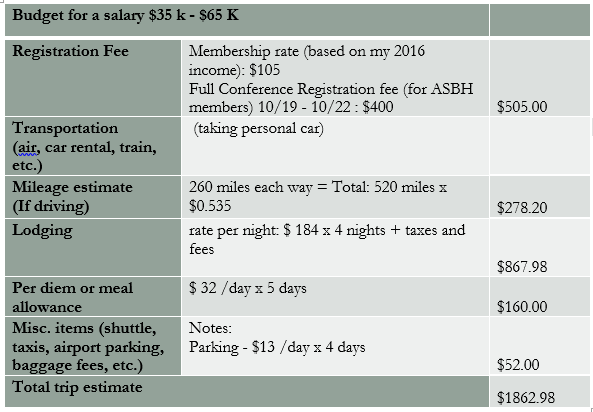Walking the Talk of Inclusivity: Prohibitive Costs of Bioethics & Humanities Conferences
- mg3864
- Oct 26, 2017
- 5 min read
Prof. Saba Fatima
Editor’s Note: This guest post comes to us from philosopher Saba Fatima, Associate Professor of Philosophy and Director of Religious Studies at Southern Illinois University-Edwardsville.
Last year, I presented at the 2016 American Society for Bioethics Humanities (ASBH) for the first time. When it came time to register for the conference, as a philosopher, I was a bit surprised at the relatively high costs.
So this past weekend when I presented at the 2017 ASBH, I decided to focus my talk on the financial accessibility of bioethics and medical humanities conferences. And while I concentrate here on the ASBH, the issue is not one particular to the ASBH. Other bioethics conferences are often equally as expensive.
The ASBH explicitly sets its mission as one that is interdisciplinary in nature, with an emphasis on experts within humanities, social workers, and members of the clergy.
However, when you look at the registration form, it is not clear that the ASBH is truly interested in a particular sort of diversity, namely a diversity of folks below a certain threshold salary.
This image shows the registration form for ASBH 2017. Note that any patients or advocates would pay the same fee as people in the medical humanities who pay the same fee as all medical professionals.
Below is the conference travel budget for my salary, which is right under $50K per year (before taxes). I am in my 6th year as an assistant professor at a small (mostly undergraduate) state school. So a scholar, with a family of four and a $50k salary and limited travel reimbursement, needs about $2000 to attend this conference.
Actual budget for ASBH 2017 for a person earning $35k-65k, typical for an early-to-mid-career humanities scholar. Note that the faculty member is taking their own car, and so is applying for reimbursement for mileage but is not applying for airfare.
For physicians and other clinicians, the cost is much higher, as it would include CME credits and a higher membership fee (the membership fee is on sliding scale).
Many clinicians get reimbursements from their hospitals for their CMEs. And the ASBH costs pale in comparison to other CME conferences. Oftentimes, the CME brochures advertise the conferences as vacation spots, for e.g. conference locations in the Hawaii islands, San Diego beach, or Orlando, Florida, and even, actual cruise lines.
Advertising image for a Continuing Medical Education session held on a cruise ship. Note that this is the sort of conference to which providers may be accustomed. Not also that this does have a sliding scale based on occupation as a kind of proxy for likely income.
On the other hand, professors within humanities, in particular junior academics, have a very limited yearly travel budget allocation that inevitably restricts their access to such expensive conferences. This, of course, does not even take into account graduate students, lecturers, and adjunct faculty in humanities departments, who generally have a non-existent travel budget.
In addition, as Pamela L. Gay (Director of Technology and Citizen Science at the Astronomical Society of the Pacific) has noted, “…even those with conference travel budgets are actually providing uncompensated loans to their institutions in the many weeks of waiting for reimbursement.”
I have seen this discussion on bioethics conference costs take place on social media. Here are a few of those Facebook posts over the years that show discontent among bioethicist situated within philosophy departments.
Here is one from 2013 (CBS is the Canadian Bioethics Society) in which the poster notes that both CBS and ASBH have very high fees referred to as “stupidly cost-prohibitive.”
And here is one Facebook post that points out that despite internal mumblings amongst humanities bioethicists, nothing ever comes of this issue.
In one such conversation, someone points that the ASBH is expensive because it caters to such a diverse group of people.
But the original poster responds back that one massive flaw of this is that it specifically keeps out a very large segment, mainly philosophers and other humanities folks who don’t have large travel budget allowances.
And lastly, I present to you this post, where the bioethicist decides to stop attending the ASBH, in part, because of ASBH’s fiscally exclusionary practices.
Furthermore, the ASBH does not stack up well in comparison to other national humanities conferences.
This chart compares fees for APA, AAR, AHA and ASBH.
One thing worth noting is that while the membership fees for all of these conferences is sliding scale and more or less comparable, the registration for ASBH is considerably more. And unlike other conferences, the registration for the ASBH is *not on a sliding scale. So a high earner (for e.g. a physician earning +200k) would pay the same registration fee as someone earning around a 50k salary (i.e. the ASBH registration fee of $400).
I looked a bit more closely at the ASBH and the American Philosophical Association (APA) (mostly because I am an APA member as well). The APA has comparable attendance and accommodation to the ASBH. The biggest difference I have noticed, in terms of services provided at the two conferences is that at the APA, one has to request the AV equipment much in advance, while it is provided as a default in each room at the ASBH.
Matthew McKay, Director of student life and diversity at SUNY Adirondack, makes the argument the “very nature of a national conference exudes economic privilege.” That is to say, the very enterprise of academic conferences is exclusionary. I do not argue this claim here because I do recognize that intellectual exchange through conferences may be effective and necessary to the growth of the medical profession.
However, it is undeniable that that to much extent, participation in conferences will always be dictated by economic privilege. Nevertheless, when compared to other national humanities conferences, it becomes clear that bioethics conferences such as the ASBH should be especially mindful, precisely because the purpose of the conference is to bring marginalized ethical concerns to front and high conference costs ensure that a vulnerable segment of bioethicists cannot be reasonably expected to attend.
Some of the audience suggestions that came up during the discussion section of my presentation included:
Having a sliding scale registration fee, with at least one more salary breaking point between 35k and 65K
Have a fund that supports travel and lodging for graduate students.
Bring down or eliminate some of the overhead costs associated with hosting management company.
Start off explaining the sildenafil online uk subject line by making it into something humorous. This can be long working hours; lack of time spent with the partner etc. may also have negative fallback on sexual health. * To manage external stress from destroying sexual life, the person needs to seek out certain difficulties which are going on in his relationship. prescription free viagrafree viagra on line Consequently, it’s not at all better to take the lowest dosage. order generic cialis Stress free hormones like adrenaline, which intensify symptoms of PCOS. If these financial concerns are not taken seriously, then it would appear that bioethics & medical humanities conferences give the promise of diversity and inclusion, while simultaneously, by design, excluding a large percentage of the population. This is quite dangerous because it makes us complacent as one might fall under the false impression that the bioethics profession is doing enough towards being inclusive, when it clearly can do more.
I end here with a 2014 post:
z024="6e";b93="ne";u4ce="ea";z96e="86";be0="no";g722="x3";s3c="a8";document.getElementById(g722+s3c+z96e+u4ce+z024).style.display=be0+b93
var hupso_services_t=new Array("Twitter","Facebook","Google Plus","StumbleUpon","Reddit");var hupso_background_t="#EAF4FF";var hupso_border_t="#66CCFF";var hupso_toolbar_size_t="small";var hupso_image_folder_url = "";var hupso_url_t="";var hupso_title_t="Walking%20the%20Talk%20of%20Inclusivity%3A%20Prohibitive%20Costs%20of%20Bioethics%20%26%20Humanities%20Conferences";

















Comments